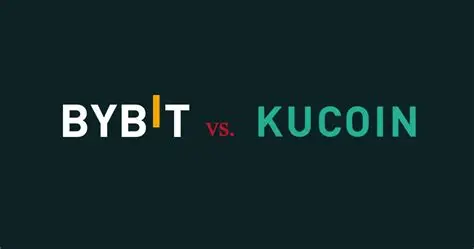I will cover the Bybit and KuCoin regarding features, trading options, trading fees, and security in the 2025 landscape of the said credibility of both exchanges.
This article will highlight the pros and cons of various trading capabilities and platforms and help you choose the most suitable exchange for your use in 2025.
What is Bybit?
Founded in 2018, Bybit is one of the few cryptocurrency exchange platforms in Dubai with a growing popularity in derivatives and futures trading, and remains to be one of top platforms in the crypto trading world in regards to providing customers with high leverage, highly advanced trading tools, and a smooth experience overall.

The platform is highly flexible, supporting cryptocurrency spot trading, perpetual contracts, copy trading, and other crypto-financial products. Bybit gives its customers an option to earn passive income through its various staking, launching projects, and yield earning features from the platform.
The exchange is one of the most reliable options in the market, employing cold wallet infrastructure, 2FA, and other security protocols to keep its users safe. To top this experience, Bybit offers an advanced mobile app which, combined with its responsive customer service, makes the platform highly accessible.
What is KuCoin ?
Since 2017, KuCoin has been operating as a global cryptocurrency exchange often refered to as ‘The People’s Exchange’ because of its enormous range of supported assets and friendly interface that makes cryptocurrency trading and other related transactions easy.

With spot trading, futures, margin trading, staking, and lending, KuCoin also has a number of other decentralized services. Users often gravitate towards KuCoin in order to gain knowledge on new altcoins as the platform has an extensive collection that is unparalleled.
On top of that, users are also able to make passive income with the staking option and KuCoin Earn. Supporting millions of users worldwide, the exchange also has a mobile app that is friendly user, and offers 24/7 support along with strong security measures including multi-layer encryption and proof of reserves.
Bybit vs KuCoin Overview
| Feature | Bybit | KuCoin |
|---|---|---|
| Founded | 2018 | 2017 |
| Headquarters | Dubai, UAE | Seychelles |
| User Base | ~20M+ users worldwide | ~30M+ users worldwide |
| Trading Focus | Derivatives & futures trading with high leverage | Wide range of altcoins & spot trading diversity |
| Supported Assets | 400+ cryptocurrencies | 700+ cryptocurrencies |
| Leverage Options | Up to 100x on derivatives | Up to 100x on futures |
| Staking & Passive Income | Staking, launchpad, copy trading, yield products | KuCoin Earn, staking, lending, DeFi products |
| Trading Fees | Maker: 0.01% / Taker: 0.06% | Maker: 0.1% / Taker: 0.1% (discount with KCS token) |
| Fiat Support | Limited, P2P trading & third-party gateways | Wide P2P trading, credit/debit cards, third-party options |
| Security | Cold wallet storage, 2FA, proof-of-reserves | Multi-layer encryption, 2FA, proof-of-reserves |
| Mobile App | Fast, beginner-friendly, pro trading tools | Feature-rich, supports diverse trading modes |
| Customer Support | 24/7 live chat, email support | 24/7 live chat, ticket system, community support |
Which Crypto Exchange Is Better?
In 2025, deciding whether one crypto exchange is better than another is a matter of personal preference for traders for their traders for their Bybit is better for professional traders who need advanced futures markets with high liquidity and high security, making it a good choice for active trading.
On the other hand, is better for users who want options having hundreds of altcoins with flexible staking, lending, and DeFi opportunities.
Both exchanges offer low rates and robust mobile apps, and Bybit leads in derivatives and KuCoin leads in altcoin diversity. Thus, the answer to “better” exchange is determined by how one trades and what their needs are.
Derivatives Trading
Bybit Derivatives Trading
Types of Contracts: Perpetual, inverse, and USDT-margined futures contracts.
Leverage: Nearly 100x on BTC, ETH, and other major pairs, and a little less on other pairs.
Liquidity: High-order books and liquidity, fantastic for professional traders.
Tools and Features: Advanced trading charts, risk management settings, copy trading, and integrated portfolio margin.
KuCoin Derivatives Trading
Types of Contracts: USDT-margined and coin-margined futures contracts.
Leverage: Up to 100x, although less developed than Bybit.
Liquidity: Good liquidity although somewhat less than Bybit for futures.
Tools and Features: Futures Grid Bot, trading bots, and simple trading interfaces.
Security & Regulation
Selecting a crypto exchange is a major decision that involves considering security and regulatory practices. ByBit and KuCoin take security seriously, utilizing cold wallet storage, two-factor authentication (2FA), anti-phishing codes, and withdrawal whitelists.
ByBit employs multi-party computation (MPC) for added private key security, and KuCoin has asset protection through an insurance fund. Each exchange has experienced security breaches which demonstrate the risk and fi regulatory compliance enables.
Bybit and KuCoin also need to manage multiple jurisdictional compliance, fines and operational restrictions.
These factors indicate that the exchanges are under heavy scrutiny. Users who are mindful of security and exchange regulatory policy practices will probably spend less of these controls.
Fees and Costs
Bybit Fees
Spot trading: Starts at 0.10% for makers and takers. VIP levels reduce fees to 0.075% taker and 0.0625% maker for higher-volume traders.
Derivatives (Futures): Taker fees are 0.055% and maker fees are 0.02%.
P2P trading: No fees on Bybit’s platform, but payment processors may apply fees.
Currency conversion: Exchanges and conversions as a foreign currency may incur fees between 0.5% and 7% and for crypto-to-crypto conversions, 0.5% to 0.9%.
KuCoin Fees
Spot trading: Base fee for makers and takers is 0.10%. If you hold KuCoin Shares (KCS), fees may reduce by as much as 20%.
Futures trading: Starts at 0.02% for makers and 0.06% for takers. At higher VIP levels, fees can be significantly reduced, where the upper limit maker fee is -0.008% (rebate) and taker fee is 0.025%.
Promotional: Certain fees for specific tokens are sometimes reduced. For instance, the NIM spot trading fee reduction was from 0.3% to 0.2% and was effective until October 3, 2025.
Supported Countries & Languages
Bybit and KuCoin are cryptocurrency exchanges that have global footprints; however, like all businesses, they have regional limitations because of regulatory issues.
Bybit has users in over 160 countries, including Japan, South Korea, Taiwan, and Hong Kong, but users in the United States, United Kingdom, Canada, Singapore, and France do not have access.
KuCoin, by comparison, has more than 200 countries users, including Japan, the Philippines, and Indonesia, but users in mainland China, Hong Kong, the United States, Singapore, Thailand, Malaysia, and Ontario Canada are restricted.
Both exchanges support users in different countries; Bybit supports English, Chinese, Japanese, and Korean, while KuCoin has over 20 different language, including Spanish, Russian, and Portuguese.
Pros & Cons Bybit vs KuCoin
Bybit Pros & Cons
Pros
- Advanced Derivatives Trading: Designed for professional traders, it provides high-leverage trading (up to 100x) on perpetual and futures contracts trading.
- Low Trading Fees: Competitive fee structure with 0.1% spot trading and 0.01% future maker fees.
- High Liquidity: During market volatility, deep order books with minimal slippage and rapid order execution are especially useful.
- Innovative Features: Enhances trading with copy trading, trading bots, and a smart trading system.
- Multi-Asset Trading: Offers trading of crypto, forex, and commodities, as well as gold on Mt5.
Cons
- Regulatory Restrictions: Not accessible to major areas such as the U.S., U.K., and China, greatly hindering the access for users in those regions.
- Security Incident: \Bybit reportedly suffered a hack in February 2025, with the loss estimated to be about \$1.5 billion in Ethereum and the attack attributed to the Lazarus Group, a North Korean outfit, as per the FBI’s records.
- Limited Fiat Onramps: Direct deposit of fiat currency is enormous restriction because it depends on 3rd party dominated regions.
KuCoin Pros & Cons
Pros
- Large Number of Coins: Offers more than 900 digital coins, a wide selection of altcoins, and newer tokens.
- Reasonable Trading Costs: Standard rate of 0.1% for base spot trading, with further reductions offered to active traders and KCS holders.
- Proficient Trading Interfaces: Offers trading bots as well as a staking service and a Web3 wallets, allowing novice and professional traders ease.
- Simple Trading Platform: Offers a clean and straightforward interface to users, with the platform being suitable for beginners and having advanced trading for professional users.
- Global Presence: Serves more than 200 countries and regions with support in several languages.
Cons
- Regulatory Issues: Has a Department of Justice Anti-Money Laundering Indictment, and has faced several other legal complications, which may limit what the exchange can do in certain places.
- Issues with Safety: In 2020, the exchange alone lost 281 million dollars, which raised questions about their level of security after a hack. They were able to recover a large portion of the funds however.
- Little support for Fiat Deposits: The exchange and platform has very few methods for deposit and withdrawal bank users under the international finance systems.
Conclusion
To sum up, both KuCoin and Bybit bring remarkable traits to 2025 crypto trading, and at the same time, maintain distinct strengths for varied user requirements.
Bybit is the perfect option for pros and volume traders who specialize in futures and leveraged derivatives as it dominates the competition in derivatives trading, liquidity, and advanced trading tools.
On the contrary, KuCoin is perfect for novice traders and altcoin fans due to its large collection of coins, simple trading tools, staking facilities, and availability in numerous countries.
In the end, both have unique trading styles, varying asset preferences, and differing risk appetites. In terms of platform security, both keep their users safe, but there is still a need for users to be updated about the regional regulations and past security issues.
FAQ
Which exchange has lower trading fees?
Bybit offers competitive fees with spot trading starting at 0.1% and futures maker fees as low as 0.02%. KuCoin also starts at 0.1% but provides discounts through KuCoin Shares (KCS) and VIP levels.
Which platform supports more cryptocurrencies?
KuCoin supports over 900 coins, making it ideal for altcoin traders. Bybit offers around 400–500 assets, focusing more on major coins and derivatives.
Are both exchanges secure?
Both have strong security measures like cold storage and 2FA, but Bybit suffered a $1.5B hack in 2025, while KuCoin experienced a $281M breach in 2020. Both recovered effectively.
Can I deposit fiat currency?
Fiat support is limited on both. Bybit relies on third-party providers, while KuCoin offers P2P and select payment gateways
Which platform is better for beginners?
KuCoin’s user-friendly interface, broad coin selection, and staking options make it more beginner-friendly. Bybit is better suited for advanced traders.









